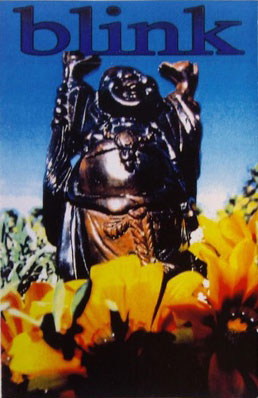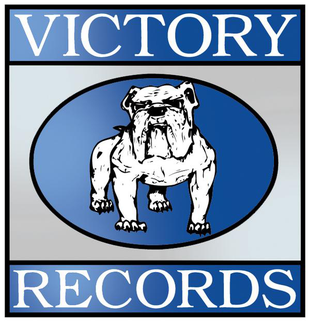Related Research Articles

Atlantic Recording Corporation is an American record label founded in October 1947 by Ahmet Ertegun and Herb Abramson. Over the course of two decades, starting from the release of its first recordings in January 1948, Atlantic earned a reputation as one of the most important American labels, specializing in jazz, R&B, and soul by Aretha Franklin, Ray Charles, Wilson Pickett, Sam and Dave, Ruth Brown and Otis Redding. Its position was greatly improved by its distribution deal with Stax. In 1967, Atlantic became a wholly owned subsidiary of Warner Bros.-Seven Arts, now the Warner Music Group, and expanded into rock and pop music with releases by Crosby, Stills, Nash & Young, Led Zeppelin, and Yes.
Mystic Records is an American record label and music production company specializing in hardcore punk, crossover thrash, underground music, vintage and cult records. It is owned and operated by Doug Moody. The label was first established in Hollywood, California, and subsequently moved its operations to Oceanside, California. Mystic Records is an independent label and is a member of the Recording Industry Association of America (RIAA).

A record label, or record company, or simply records, is a brand or trademark of music recordings and music videos, or the company that owns it. Sometimes, a record label is also a publishing company that manages such brands and trademarks, coordinates the production, manufacture, distribution, marketing, promotion, and enforcement of copyright for sound recordings and music videos, while also conducting talent scouting and development of new artists, and maintaining contracts with recording artists and their managers. The term "record label" derives from the circular label in the center of a vinyl record which prominently displays the manufacturer's name, along with other information.

Buddha is a demo album by the American rock band Blink-182. Recorded and released in January 1994 under the name Blink, it was the band's first recording to be sold and distributed. The band had recorded two previous demos in drummer Scott Raynor's bedroom—Flyswatter and Demo No.2—using a four track recorder. Most of the tracks from Buddha were re-recorded for the band's subsequent releases; seven were re-recorded for their debut album Cheshire Cat and one was re-recorded for their second album Dude Ranch.

In the United States, the Recording Industry Association of America (RIAA) operates an awards program based on the certified number of albums and singles sold through retail and other ancillary markets. Other countries have similar awards. Certification is not automatic; for an award to be made, the record label must first request certification. The audit is conducted against net shipments after returns, which includes albums sold directly to retailers and one-stops, direct-to-consumer sales and other outlets.
Interscope Records is an American record label based in Santa Monica, California, owned by Universal Music Group through its Interscope Geffen A&M imprint. Founded in late 1990 by Jimmy Iovine and Ted Field as a $20 million joint venture with Atlantic Records of Warner Music Group and Interscope Communications, it differed from most record labels by letting A&R staff control decisions and allowing artists and producers full creative control. Interscope's first hit records arrived in under a year, and it achieved profitability in 1993. Chair and CEO until May 2014, Iovine was succeeded by John Janick.
A greatest hits album or best-of album is a type of compilation album that collects popular and commercially successful songs by a particular artist or band. While greatest hits albums are typically supported by the artist, they can also be created by record companies without express approval from the original artist as a means to generate sales. They are typically regarded as a good starting point for new fans of an artist, but are sometimes criticized by longtime fans as not inclusive enough or necessary at all.

Cash Money Records is an American record label founded in 1991 by brothers Ronald "Slim" Williams and Bryan "Birdman" Williams. The label gained prominence in the late 1990s for having signed and released albums for New Orleans-based musical acts including Juvenile, B.G., and Hot Boys. It became an imprint of Universal Records, a division of Universal Music Group in March 1998, and remained so during its following iterations as Universal Republic, Universal Motown and ultimately Republic Records.
Warner Records Inc. is an American record label. A subsidiary of the Warner Music Group, it is headquartered in Los Angeles, California. It was founded on March 19, 1958, as the recorded music division of the American film studio Warner Bros.

Modular Recordings was an Australian record label founded in 1998 by Steve Pavlovic that by 2015 was owned by Universal Music Australia. It has released music from local artists such as Eskimo Joe, Ben Lee, The Avalanches, Wolfmother, Cut Copy, The Bumblebeez, Bag Raiders, Van She, Rocket Science, Ghostwood, The Presets, Pond, and Tame Impala, and local releases of international artists including Dom, Yeah Yeah Yeahs, Chromeo, Colder, Klaxons, Ladyhawke, NYPC, MSTRKRFT, and Softlightes.

Supernatural is the eighteenth studio album by American rock band Santana, released on June 15, 1999, on Arista Records. After Santana found themselves without a label in the mid-1990s, founding member and guitarist Carlos Santana began talks with Arista president Clive Davis, who had originally signed the group to Columbia Records in 1969. Santana and Davis worked with A&R man Pete Ganbarg, as Santana wanted to focus on pop and radio-friendly material. The album features collaborations with several contemporary guest artists, including Rob Thomas, Eric Clapton, Eagle-Eye Cherry, Lauryn Hill, Dave Matthews, Maná, and CeeLo Green.
Universal Records was a record label owned by Universal Music Group and operated as part of the Universal Motown Republic Group. The label has been dormant since 2006, due to Universal Motown and Universal Republic Records being formed and taking all of the artists from it. Those labels were eventually combined to form the latest iteration of Republic Records.

Allen Klein was an American businessman whose aggressive negotiation tactics affected industry standards for compensating recording artists. He founded ABKCO Music & Records Incorporated. Klein increased profits for his musician clients by negotiating new record company contracts. He first scored monetary and contractual gains for Buddy Knox and Jimmy Bowen, one-hit rockabillies of the late 1950s, then parlayed his early successes into a position managing Sam Cooke, and eventually managed the Beatles and the Rolling Stones simultaneously, along with many other artists, becoming one of the most powerful individuals in the music industry during his era.
Independent music is a style of music that is characterized by creative freedoms, low-budgets, and a do-it-yourself approach to music creation, which originally grew out of the freedoms afforded by independent record labels.

Victory Records is a Chicago-based record label founded by Tony Brummel. It operates a music publishing company called "Another Victory, Inc." and is the distributor of several record labels. It has featured many prominent artists including Thursday, Hawthorne Heights, Silverstein, Taking Back Sunday, Bayside, Streetlight Manifesto, and A Day to Remember.

The music industry refers to the individuals and organizations that earn money by writing songs and musical compositions, creating and selling recorded music and sheet music, presenting concerts, as well as the organizations that aid, train, represent and supply music creators. Among the many individuals and organizations that operate in the industry are: the songwriters and composers who write songs and musical compositions; the singers, musicians, conductors, and bandleaders who perform the music; the record labels, music publishers, recording studios, music producers, audio engineers, retail and digital music stores, and performance rights organizations who create and sell recorded music and sheet music; and the booking agents, promoters, music venues, road crew, and audio engineers who help organize and sell concerts.
A recording contract is a legal agreement between a record label and a recording act, where the act makes an audio recording for the label to sell and promote. Artists under contract are normally only allowed to record for that label exclusively; guest appearances on other artists' records will carry a notice "By courtesy of ", and that label in question may receive a percentage of sales through publishing.
A publishing contract is a legal contract between a publisher and a writer or author, to publish original content by the writer(s) or author(s). This may involve a single written work, or a series of works.

19 Recordings Inc. is a New York–based record label owned by 19 Entertainment. Founded in London by British entrepreneur Simon Fuller in 1999 as the music division of 19 Entertainment, the label is one of the top record imprints as compiled by Billboard in 2012. 19 Recordings has the exclusive rights to sign contestants of the television series Idols. Since 2005, it shifted its main operations to the United States following CKX, Inc.'s acquisition of 19 Entertainment.

Record sales or music sales are activities related to selling music recordings through physical record shops or digital music stores. Record sales reached their peak in 1999, when 600 million people spent an average of $64 on records, achieving $40 billion in sales of recorded music. Sales continued declining in the 21st century. The collapse of record sales also made artists rely on touring for most of their income. By 2019, record sales accounted for less than half of global recorded music revenue, overtaken by streaming. Following the inclusion of streaming into record charts in the mid-2010s, record sales are also referred to as traditional sales or pure sales.
References
- ↑ Millman, Ethan. "Kanye West's Record Deal Is Standard. That Doesn't Mean the Record Industry Is Fair". Rolling Stone. Penske Media Corporation. Retrieved January 31, 2022.
- ↑ Leight, Elias. "Sony Music Is Wiping Out the Old Debts of Catalog Artists". Rolling Stone. Penske Media Corporation. Retrieved January 31, 2022.
- ↑ "The Ins and Outs of Signing a Record Deal". Awal. Retrieved 2021-05-14.